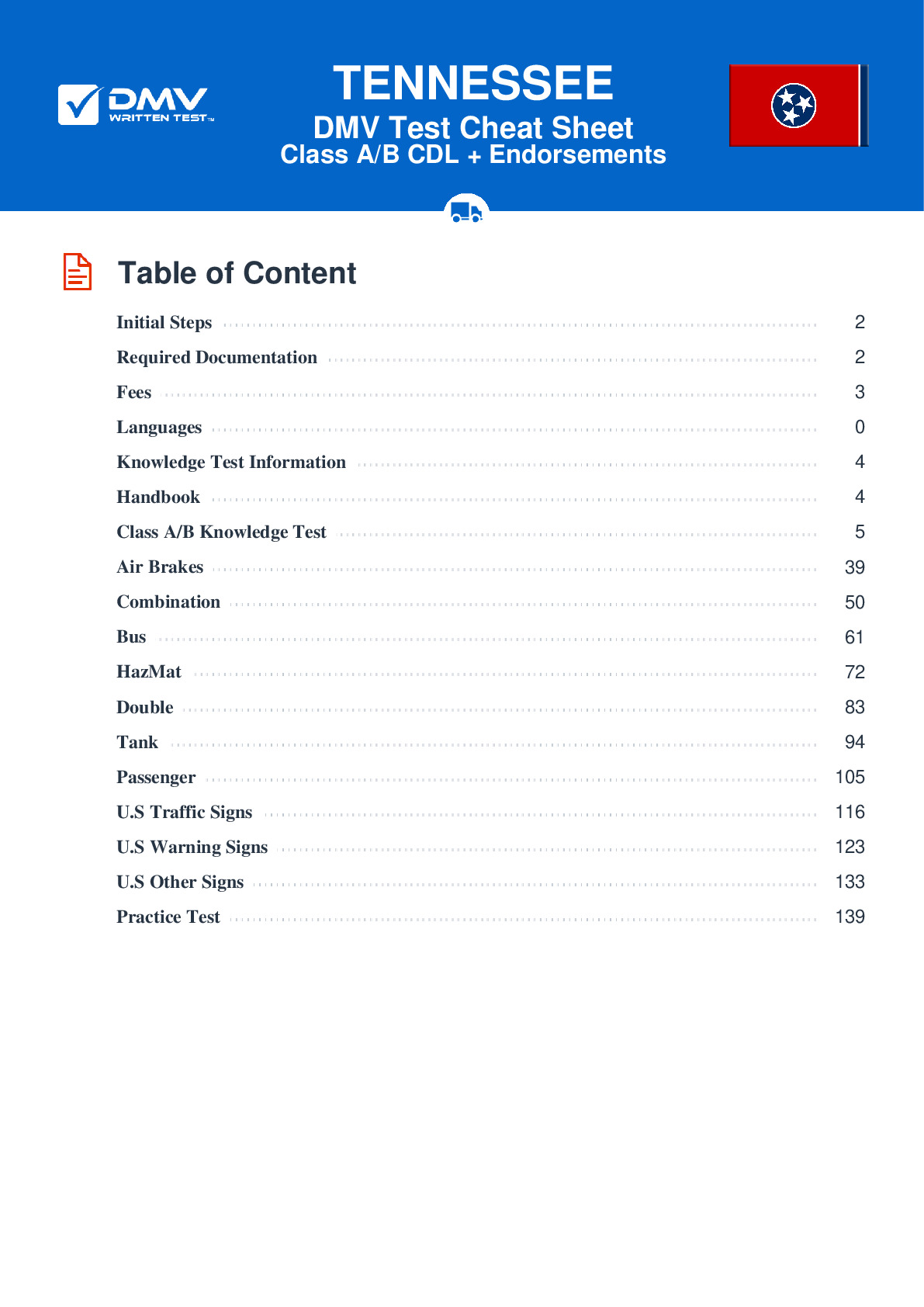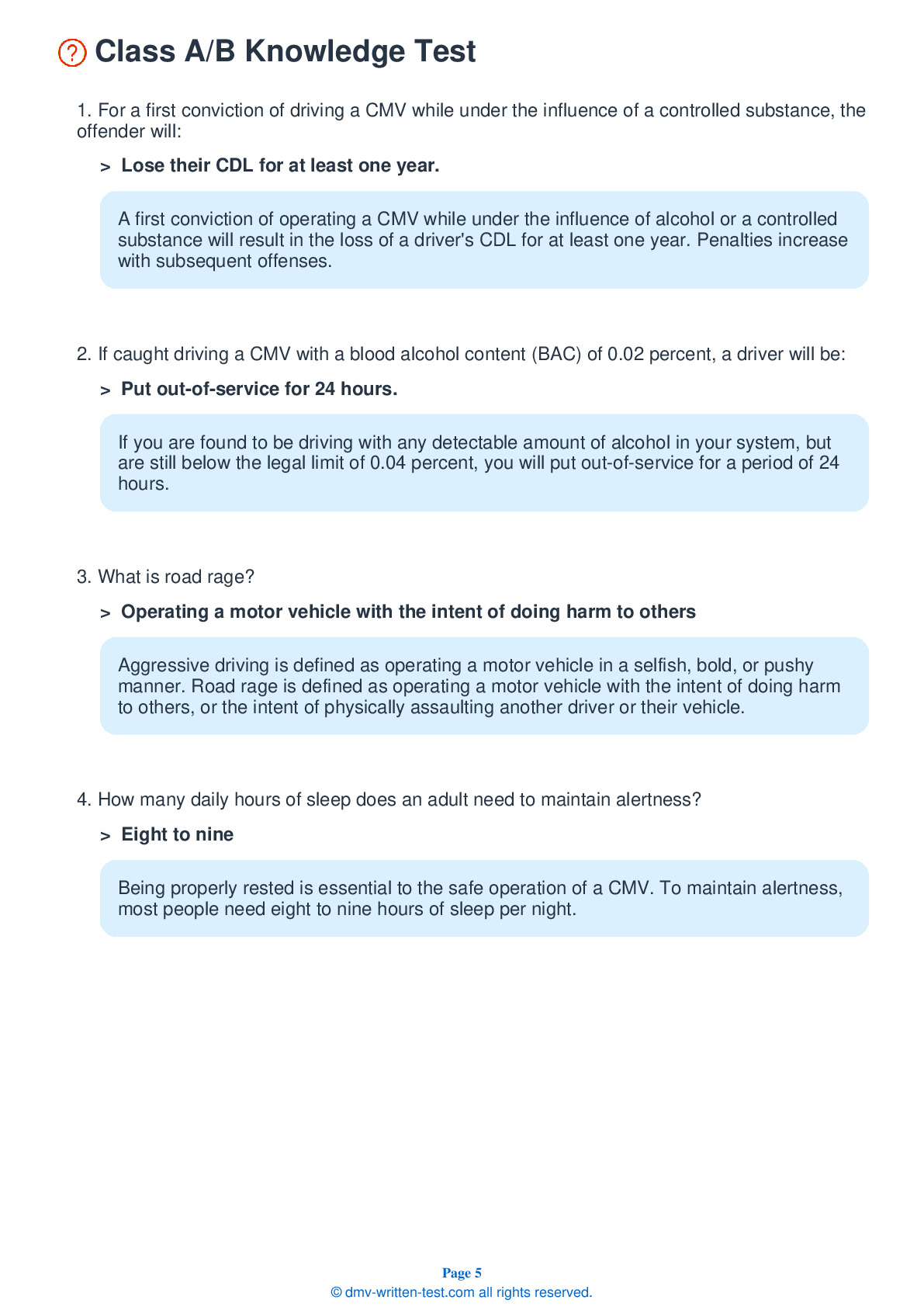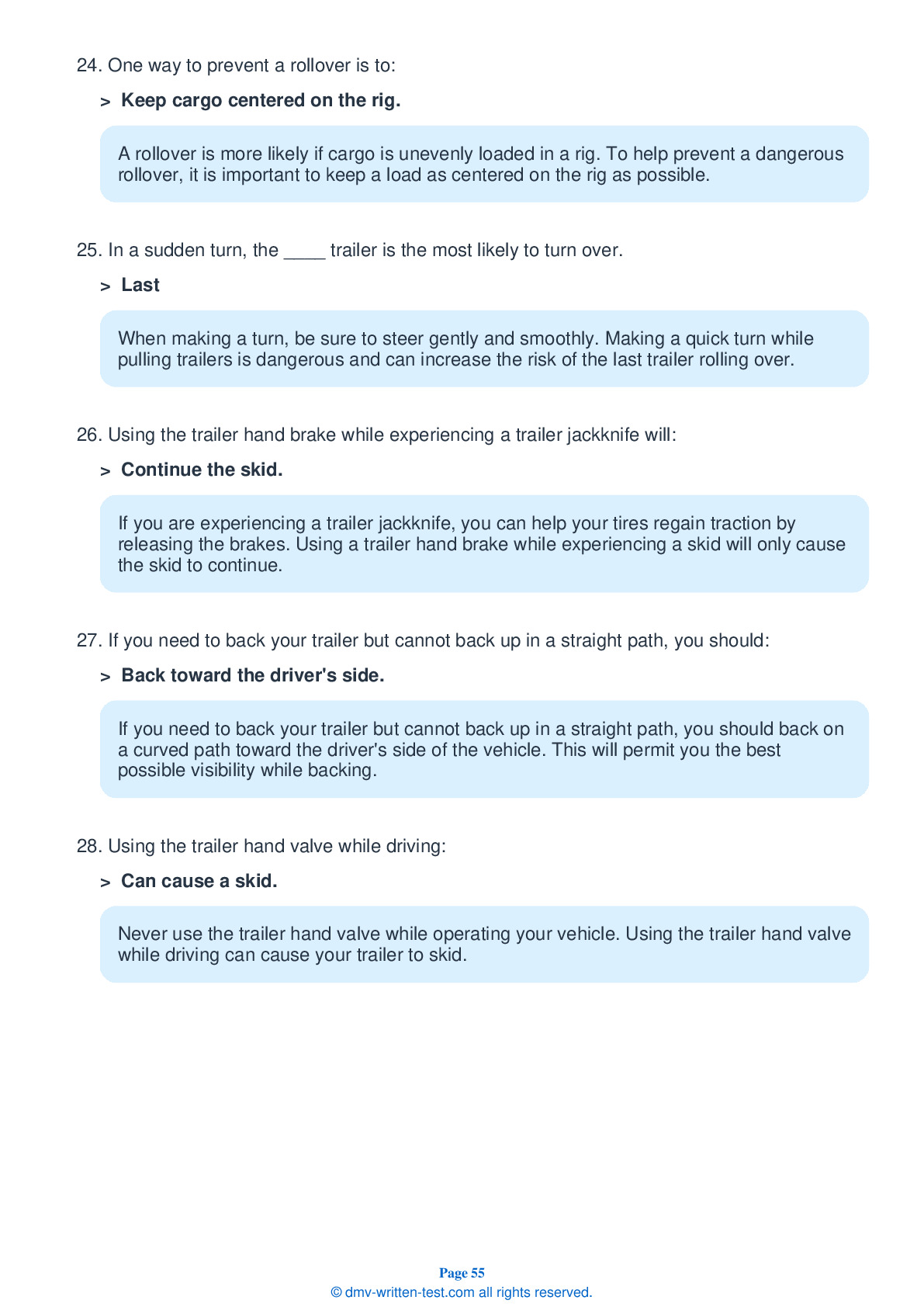Knowledge Test Class B
This license is required for driving a single vehicle with a GVWR of more than 26,001 pounds, and a trailer not to exceed 10,000 pounds gross vehicle weight rating, or a vehicle designed to transport 24 or more people (including the driver). To receive this license, applicants must pass a 50-question test. To pass, applicants must answer 40 questions correctly. Each question has three or four possible answer choices. Test questions come from the Commercial Driver License Manual. Questions come from chapters covering: Introduction, Driving Safely, Transporting Cargo Safely, Air Brakes (if applicable), Pre-Trip Vehicle Inspection Test, Basic Vehicle Control Skills Test and On-Road Driving.. Endorsements that may be used with a Class B CDL are: Hazardous materials, Tank, Passenger, HazMat and Tank, Air Brakes and School bus.
43. If carrying a heavy load that is slowing you down, you should:
The right lanes of a roadway are generally intended for vehicles traveling more slowly than surrounding traffic. If being slowed down by a heavy load, you should stay in the right lane.
44. A header board is used to:
Front-end header boards, also known as "headache racks," protect drivers from moving cargo in the event of a crash or emergency stop.
45. When completing a driver's side parallel parking maneuver, you should:
You may be asked to complete a parallel parking maneuver into a parking space that is to the left of your vehicle. You should drive past the parking space before backing into it while bringing the rear of your vehicle as close to the rear of the space as possible. Your vehicle should be completely within the boundaries of the space.
46. Which of the following is not a warning sign of fatigue?
Potential warning signs of fatigue include difficulty focusing, frequent blinking, or heavy eyelids; yawning repeatedly or rubbing your eyes; daydreaming; wandering or disconnected thoughts; trouble remembering the last few miles you've driven; missing exits or traffic signs; having trouble keeping your head up; drifting from your lane; following too closely; hitting a shoulder rumble strip; or feeling restless and irritable.
47. When inspecting the windshield before a trip, a person should do all the following, except:
When inspecting your windshield, you should look for cracks or other problems that could interfere with your ability to clearly see the road. The windshield wiper arms should be checked for proper spring tension. The wiper blades should be checked for damage, stiff rubber, and improper securement.
48. Eating while driving:
Eating while driving can be a dangerous distraction to the driver both because it diverts their attention away from the task at hand and requires them to remove a hand from the steering wheel.
49. What can happen if one-fourth of the leaves in a leaf spring are missing when a vehicle is inspected?
If at least one-fourth of the leaves in a leaf spring are missing, the vehicle will be put out-of-service until the defect is fixed.
50. When checking its automatic transmission fluid, the vehicle:
Your vehicle's engine may need to be running in order for you to check the level of its automatic transmission fluid.
Frequently Asked Questions
1. Obtain and review the Tennessee Commercial Driver License Manual.
2. Pass a DOT physical examination and obtain a medical certificate.
3. Obtain a Commercial Learner’s Permit (CLP) by passing the knowledge tests for the Class B CDL.
4. Hold your CLP for at least 14 days before taking the skills test.
5. Schedule and pass the skills test at a Tennessee Department of Safety and Homeland Security approved testing location.
6. Pay the appropriate fees and obtain your Class B CDL from the Tennessee Department of Safety and Homeland Security.
It is important to note that additional endorsements may be required for certain types of vehicles or cargo, such as hazardous materials or passenger transport.
- Straight trucks and box trucks
- Dump trucks
- Large buses (such as school buses and city transit buses)
- Tow trucks with a heavy tow rating
- Cement mixers and other heavy construction vehicles
- Motorhomes and RVs over 26,000 pounds
However, it is important to note that certain types of vehicles or cargo may require additional endorsements on your CDL. For example, if you want to transport hazardous materials, you will need to obtain a Hazardous Materials (HAZMAT) endorsement on your CDL.
1. Be at least 18 years old (21 years old if you plan to drive across state lines or transport hazardous materials).
2. Hold a valid Tennessee driver's license.
3. Pass a DOT physical examination and obtain a medical certificate.
4. Provide proof of your legal presence in the United States, such as a birth certificate or passport.
5. Provide your Social Security Number.
6. Obtain a Commercial Learner’s Permit (CLP) by passing the knowledge tests for the Class B CDL.
7. Hold your CLP for at least 14 days before taking the skills test.
8. Schedule and pass the skills test at a Tennessee Department of Safety and Homeland Security approved testing location.
9. Pay the appropriate fees and obtain your Class B CDL from the Tennessee Department of Safety and Homeland Security.
It is important to note that additional endorsements may be required for certain types of vehicles or cargo, such as hazardous materials or passenger transport, and that you must pass both knowledge and skills tests to obtain your Class B CDL.
If you plan to transport hazardous materials or drive across state lines, you must be at least 21 years old to obtain a Class B CDL. Additionally, some employers may have their own age requirements that exceed the state minimum.
1. Passenger endorsement (P) - required for drivers who plan to transport more than 15 passengers, including the driver.
2. School bus endorsement (S) - required for drivers who plan to operate a school bus that transports passengers to and from school or school-related activities.
3. Tanker endorsement (N) - required for drivers who plan to transport liquids or gases in bulk containers with a capacity of 1,000 gallons or more.
4. Hazardous materials endorsement (H) - required for drivers who plan to transport hazardous materials, as defined by the Federal Motor Carrier Safety Administration (FMCSA).
To obtain these endorsements, you must pass additional knowledge tests and meet other requirements, such as background checks and fingerprinting. It is important to note that some employers may also have their own endorsement requirements that exceed the state minimum.
1. Pre-trip inspection - You will be required to perform a thorough inspection of your vehicle and demonstrate your knowledge of the vehicle’s components and safety features.
2. Basic vehicle control - You will be tested on your ability to control the vehicle in a closed course environment. This includes maneuvers such as straight-line backing, offset backing, and parallel parking.
3. Road test - You will be evaluated on your ability to safely operate the vehicle on public roads and highways. This includes starting, stopping, turning, merging, changing lanes, and other general driving skills.
During the test, you will be evaluated by a certified CDL examiner who will score you based on your performance. To pass the skills test, you must score at least 80% on each part of the test.
It is important to note that the specific requirements and scoring criteria may vary depending on the type of vehicle or endorsement you are testing for.
1. Air brake restriction - If you take the skills test in a vehicle without air brakes, you will have an “L” restriction on your license that prohibits you from operating a vehicle with air brakes.
2. Passenger restriction - If you did not take the skills test with a passenger vehicle, you will have a “P” restriction on your license that prohibits you from operating a vehicle designed to transport 16 or more passengers.
3. School bus restriction - If you did not take the skills test with a school bus, you will have an “S” restriction on your license that prohibits you from operating a school bus.
4. Endorsement restrictions - If you did not pass the necessary endorsement tests, such as the hazardous materials or tanker endorsement tests, you will not be able to operate vehicles with those endorsements.
It is important to note that employers may also have their own restrictions or requirements for drivers beyond what is required by the state. Therefore, it is important to check with your employer and understand any additional restrictions or requirements that may apply to your specific job.
If you prefer to take the written test in a language other than English, you must bring someone to interpret for you. The interpreter must be fluent in both English and the language you are testing in. The interpreter cannot be a CDL holder or employee of the Tennessee Department of Safety and Homeland Security.
It is also important to note that the skills test must be taken in English. So, if you pass the written test in a language other than English and want to obtain a Class B CDL license, you will need to pass the skills test in English.
To request accommodations, you will need to fill out the Request for Reasonable Accommodations form and submit it to the Tennessee Department of Safety and Homeland Security at least 30 days before your scheduled test date. The form can be found on the Tennessee Department of Safety and Homeland Security website.
The form asks for information about your disability and the specific accommodations you are requesting. Examples of accommodations that may be provided include extended time on the test, a reader or scribe, or a separate testing room.
Once your request is received, the Tennessee Department of Safety and Homeland Security will review it and determine if the requested accommodations are reasonable and appropriate. If your request is approved, they will work with you to schedule a test date that accommodates your needs.
First, you must wait at least one day before retaking the test. If you fail the test three times, you must wait at least 30 days before retaking it again.
Second, you will need to pay a fee each time you take the test. As of 2021, the fee for a CDL written test is $25.
Third, it is important to review the material and study before retaking the test. You may want to consider taking a CDL practice test or reviewing the CDL manual to better prepare for the exam.
Lastly, keep in mind that passing the written test is only one step in obtaining a Class B CDL license. You will also need to pass a skills test that includes a pre-trip inspection, basic control skills test, and road skills test.




